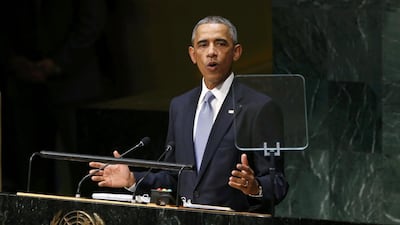UNITED NATIONS // Barack Obama outlined a dramatically more engaged role for the US in working to end the turmoil in the Middle East, pledging to foster negotiations between regional powers to end proxy conflicts, undermine extremist ideology and take military action with allies to destroy ISIL.
“The only language understood by killers like this is the language of force,” Mr Obama said during his speech to the United Nations General Assembly. “So the United States of America will work with a broad coalition to dismantle this network of death.”
The tone of the 40-minute address contrasted sharply with speeches made since his reelection stating that the US was backing down from a war footing in the region. It came as an attempted rebuke to critics in Washington and the Middle East who have said his administration has lacked a strategy to deal with the region’s many crises, and has been too reticent to wield US power after a decade of war.
“We will neither tolerate terrorist safe-havens, nor act as an occupying power,” Mr Obama said. “Instead, we will take action against threats to our security — and our allies — while building an architecture of counterterrorism cooperation … The brutality of terrorists in Syria and Iraq forces us to look into the heart of darkness.”
The “cancer of violent extremism” and the threat posed by ISIL as well as the Ebola crisis and Russian disregard for international law, Mr Obama warned, were all threatening global stability and he called on world leaders to unite against these threats through a renewed international order.
“We come together at a crossroads between war and peace; between disorder and integration; between fear and hope,” he said.
The speech came as the US president tries to rally more international support at the UN this week for his coalition to fight ISIL, and as the US and five Arab allies bombed ISIL targets in Syria for a second day.
Mr Obama was set to chair a session of the Security Council later on Wednesday regarding the threat of Islamist foreign fighters, and he said it will adopt a binding resolution forcing countries to pass laws on the issue.
He was also scheduled to meet new Iraqi prime minister Haider Al Abadi, and UK premier David Cameron on Wednesday, and Egyptian president Abdel Fattah El Sisi on Thursday. Talks are likely to focus the countries’ commitments to countering ISIL.
Mr Obama met briefly on Tuesday with ministers from the five Arab countries who are participating in airstrikes against ISIL targets in Syria — the UAE, Saudi Arabia, Qatar, Bahrain and Jordan — to thank them for their efforts.
Along with the military action against Islamist militants, Mr Obama also emphasised the need for Muslim leaders in the region and across the world to undermine extremist ideology.
“That means contesting the space that terrorists occupy — including the internet and social media,” he said. “Their propaganda has coerced young people to travel abroad to fight their wars, and turned students into suicide bombers. We must offer an alternative vision.”
He also indirectly chided Gulf Arab states who have failed to stem private funding of extremism in Syria and elsewhere. “It’s time to end the hypocrisy of those who accumulate wealth through the global economy, and then siphon funds to those who teach children to tear it down.”
A growing source of instability and violence in the Middle East is sectarian conflict between Sunni and Shiite groups, some of whom are backed by regional rivals Tehran and Riyadh. “It’s time for a broader negotiation in which major powers address their differences directly, honestly, and peacefully across the table from one another, rather than through gun-wielding proxies,” Mr Obama said. “I can promise you America will remain engaged in the region, and we are prepared to engage in that effort”.
While emphasising that a political solution is the only way “for this madness to end” in Syria, “whether one year from now or 10”, Mr Obama said nothing about how he planned to help bring that about, a stark difference from the consistent focus a year ago on the Geneva negotiation process between Damascus and rebels.
He did reiterate that the US will train and equip moderate rebels in Syria as a “counterweight to the terrorists of ISIL and the brutality of the Assad regime”.
In a throwback to his 2009 address to the Muslim world from Cairo, the US leader “directly” addressed young Muslims, saying the US “will partner with those that promote” a tolerant vision based on education, innovation, entrepreneurship and women’s rights and a vibrant civil society.
tkhan@thenational.ae

